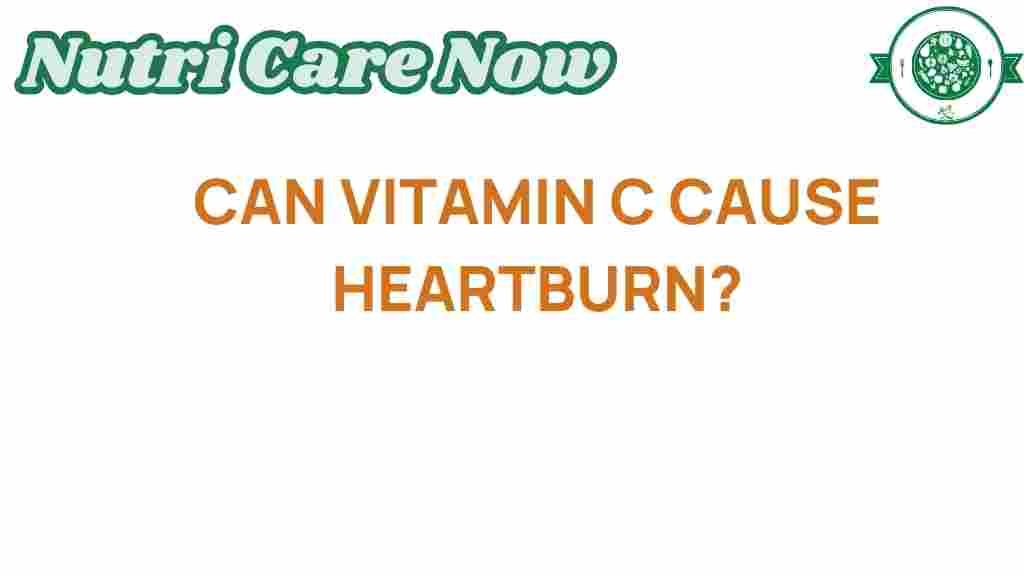Is Vitamin C the Hidden Culprit Behind Your Heartburn?
Heartburn is a common ailment characterized by a burning sensation in the chest, often resulting from acid reflux. Many people turn to dietary supplements, believing they can improve their digestive health, but some may not realize that certain vitamins, particularly Vitamin C, could exacerbate their symptoms. In this article, we will explore the relationship between Vitamin C and heartburn, examining how this essential nutrient may affect acidity and overall wellness.
Understanding Heartburn and Its Causes
Heartburn occurs when stomach acid flows back into the esophagus, leading to discomfort. The condition can be triggered by various factors, including:
- Dietary choices, such as spicy foods, chocolate, and citrus fruits
- Eating large meals or lying down soon after eating
- Obesity and being overweight
- Smoking and alcohol consumption
- Certain medications and dietary supplements
While heartburn is often linked to dietary habits, it’s important to consider how vitamins and supplements play a role in digestive health.
The Role of Vitamin C in the Body
Vitamin C, also known as ascorbic acid, is a powerful antioxidant that supports various bodily functions, including:
- Boosting the immune system
- Promoting skin health
- Enhancing iron absorption
- Supporting collagen production
As a water-soluble vitamin, Vitamin C is found in many fruits and vegetables, such as oranges, strawberries, and bell peppers. Many people also take Vitamin C as a dietary supplement to enhance their health and well-being.
Vitamin C and Heartburn: The Connection
While Vitamin C is essential for health, its acidic nature can lead to increased acidity in the stomach, which may contribute to heartburn in some individuals. Here are a few factors to consider:
- Acidity Levels: Vitamin C supplements often contain ascorbic acid, which can elevate the acidity in the stomach, potentially triggering heartburn symptoms.
- Doses Matter: High doses of Vitamin C, especially in supplement form, can overwhelm the digestive system and lead to gastrointestinal discomfort.
- Individual Sensitivity: Some individuals may have a heightened sensitivity to acidic foods or supplements, making them more prone to heartburn.
Identifying If Vitamin C Is Causing Your Heartburn
If you suspect that Vitamin C is a contributing factor to your heartburn, follow these steps to identify the issue:
- Track Your Symptoms: Keep a journal of your heartburn episodes, noting when they occur and what you recently consumed, including dietary supplements.
- Analyze Your Vitamin C Intake: Determine how much Vitamin C you are taking daily, both through diet and supplements.
- Consult a Healthcare Professional: Discuss your findings with a doctor, who may recommend adjusting your Vitamin C intake or suggest alternative sources.
Managing Heartburn Linked to Vitamin C
If you find that Vitamin C is indeed causing your heartburn, here are some strategies to mitigate its effects:
- Reduce Supplement Dosage: If you are taking high doses of Vitamin C, consider lowering the amount or switching to a less acidic form of the vitamin.
- Choose Whole Food Sources: Focus on obtaining Vitamin C from whole foods rather than supplements, as fruits and vegetables often contain additional nutrients that aid digestion.
- Timing Matters: Take your Vitamin C supplements with meals to buffer the acidity and minimize the risk of heartburn.
- Avoid Trigger Foods: Pay attention to other foods that may exacerbate heartburn, such as spicy dishes, caffeine, and alcohol.
Alternative Sources of Vitamin C
If you need to limit your Vitamin C intake from supplements, consider these alternative sources:
- Fruits: Oranges, kiwis, strawberries, and guavas are rich in Vitamin C and can be easier on the stomach.
- Vegetables: Bell peppers, broccoli, and Brussels sprouts are excellent sources of this essential vitamin.
- Herbs: Fresh herbs like parsley and thyme also contain Vitamin C and can be included in various dishes.
Other Dietary Supplements to Consider
While Vitamin C is essential, other dietary supplements might help improve digestive health without causing heartburn. Some options include:
- Probiotics: These beneficial bacteria support gut health and can help alleviate digestive issues.
- Digestive Enzymes: These supplements aid in breaking down food, which can reduce the burden on your digestive system.
- Ginger: Known for its anti-inflammatory properties, ginger can help soothe the stomach and reduce nausea.
When to Seek Medical Advice
While occasional heartburn is common, you should consult a healthcare professional if you experience:
- Frequent heartburn (more than twice a week)
- Severe chest pain or discomfort
- Difficulties swallowing or persistent nausea
- Unexplained weight loss
These symptoms may indicate a more serious condition that requires medical attention.
Conclusion
Vitamin C is a vital nutrient that plays a significant role in maintaining overall health, but for some individuals, it can be a hidden culprit behind heartburn. Understanding the relationship between Vitamin C and digestive health is crucial for managing symptoms effectively. By monitoring your intake, opting for whole food sources, and considering alternative supplements, you can protect your digestive wellness while still reaping the benefits of this essential vitamin.
Remember, if you suspect that Vitamin C or any other dietary supplement is affecting your health, it’s always best to consult with a healthcare professional for personalized advice. For more information on maintaining digestive health, check out this helpful resource.
Stay informed about your nutrition and wellness choices, and take control of your health today!
This article is in the category Health and created by NutriCareNow Team

1 thought on “Is Vitamin C the Hidden Culprit Behind Your Heartburn?”